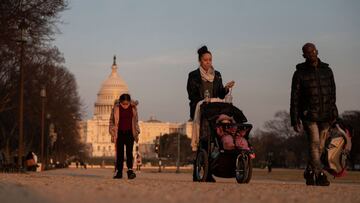How have congressional seats changed after new census? which states will gain or lose seats?
The first results of the 2020 census were released and the US population has grown to 331 million. The results will reshape the balance of power.

The US Constitution dictates that every ten years the US shall undertake a census to determine the population which in turn will determine the number of seats each state is accorded in Congress.
The US has held a census every decade since 1790 and the latest census revealed that the US population grew by the lowest rate since the 1930s at just 7.4 percent. Unlike in the 1930s though this looks to be part of a decades long trend tied to an aging population, decreased fertility and reduced immigration.
Who were the winners and losers in the 2020 census?
The South saw the fastest growth over the last decade, with a 10.2 percent increase in population according to the US Census Bureau data. The Northeast and Midwest saw the slowest growth especially in the Rust Belt, with West Virginia losing 3.2 percent of its population compared to 2010. The West grew but California is no longer the engine of growth and grew by less than the national average over the last decade at just 6.1 percent.
How will the numbers change the shape of Congress?
The results of the latest decennial census will determine how the states divvy up the 435 seats in the House of Representatives in a process known as reapportionment. The number has been unchanged since 1929 when the Permanent Apportionment Act became law, permanently setting the maximum number and automatically reapportioning seats after each census. Now each member of the House will represent an average of 761,169 people based on the 2020 Census.
Five states picked up a seat in Congress; Colorado, Florida, Montana, North Carolina, and Oregon. But the biggest gain was seen by Texas which now has two more seats in the House. Seven states saw their congressional delegation shrink by a seat; California, Illinois, Michigan, New York, Ohio, Pennsylvania, and West Virginia.
Surprisingly, Rhode Island managed to hold on to both House seats the state currently has. But the loss of the seat in New York is especially hard to swallow due to falling short by just 89 people. Florida was also disappointed, although the state picked up a seat, it expected to gain two.
A challenging census to perform
The 2020 census was not without controversy and any state that thinks it got stiffed can challenge the results in court. The composition of the questions, political fights and the Four Horsemen made the counting a fraught exercise.
In the build-up to the census there were controversies about what was going to be asked on the census. The Trump administration added a question asking if people are US citizens in March 2018. The Supreme Court eventually blocked the decision but it caused confusion and fear in some immigrant communities.
During a critical preparation time for the census in January of 2019 the federal government was partially shutdown furloughing some census staff. Then in October last year the Trump administration got the go-ahead to stop the census counting early from the supreme court.
Acts of God also had a go at complicating the task of carrying out the census. In March 2020 a once in a century pandemic hit right as the census forms were being mailed. The covid-19 pandemic put field operations on hold for almost two months. Then in September last year the country was hit by a series of hurricanes and wildfires in the last full month of counting.
This affected the ability of door-knockers for the Census Bureau to get out to communities that are at risk of being undercounted. However, Associate Director for Decennial Census Programs Albert Fontenot Jr felt that despite the problems with the pandemic “we feel very confident that we did a good job of collecting data.”






